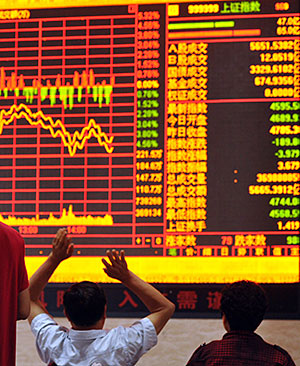SDR move seen as vote of confidence in China’s leaders
Simply sign up to the Currencies myFT Digest -- delivered directly to your inbox.
China’s leaders have long sought to win a place for the renminbi in the International Monetary Fund’s elite basket of reserve currencies. The move would not only cement the redback’s role in the financial system. It will also give those leaders a vote of confidence they have craved for years.
From October 1 next year the renminbi is set to take pride of place alongside the British pound, the dollar, euro, and yen in the IMF basket.
Yet there is considerable uncertainty over how markets might react to such a step. Would an IMF decision, as some argue, trigger a massive flow of capital — as much as $1tn in the relatively short-term, according to Goldman Sachs — into renminbi-denominated assets? Or might markets greet the news with a shrug?
Of itself, the move would be largely symbolic. Created in 1969 as an alternative to gold as a store for central bank reserves, the fund’s Special Drawing Rights are something of an anachronism. They are rarely used outside fund business and internal discussions. IMF rescue packages may be officially valued in SDRs and as a percentage of countries’ quotas in the fund but real-world discussions of them are still conducted in dollars, euros and local currencies.
But when it comes to nations and their standing in the world symbols matter. The renminbi, it is worth remembering, is still far from being an international reserve currency.
Though China’s economic expansion has driven a surge in the volume of trade and transactions conducted in renminbi, it only accounts for a small proportion of the world’s official reserves.
An IMF survey of the fund’s 188 member countries found just 38 held any of their official foreign currency reserves in renminbi in 2014, accounting for just 1.1 per cent of the world’s assets, or roughly half the number and share of those using the Australian dollar. The US dollar, by way of comparison, was used by 127 countries accounting for almost 64 per cent of global foreign currency reserves while the euro accounted for a further 21 per cent.
That figure for the renminbi is low partly because until the IMF began coaxing Beijing into the reforms needed to qualify for the SDR basket, there were very few places that central banks could park reserves in renminbi. In 2014, for example, just 1.4 per cent of international debt securities, issued were denominated in renminbi, according to Bank for International Settlements data.

That has been changing, however, as China has pursued reforms in the hope of winning the renminbi’s inclusion. Beijing has opened up its domestic bond market to foreign central banks. Deals have also been struck to allow the greater issuance of renminbi-denominated bonds in places such as London.
The question is whether such moves will translate into broader confidence in China’s economic prospects.
Investors remain nervous about the country’s challenges, as exemplified by the turmoil caused this summer by Beijing’s decision to devalue the renminbi. Against this volatile backdrop, it may take years to develop markets in renminbi assets that have the depth and liquidity needed to persuade central banks that they are a safe place to park taxpayers’ money.
“Inclusion in the SDR basket could be taken as endorsement by the IMF that the renminbi and China’s financial markets meet this standard. But central banks are likely to come to their own judgment,” Mark Williams, chief Asia economist for Capital Economics, wrote after the IMF announced its recommendation for the renminbi’s inclusion on November 13.
However, he warned that the market gyrations of the summer and Beijing’s response meant that, “if anything, the renminbi’s chances of being taken seriously as a reserve asset have gone backwards recently”.
China’s leadership had responded to concerns about capital outflows by making it harder to move capital abroad. Following collapses in stock prices it also suspended trading in many shares, he pointed out, effectively freezing the ability of investors to sell assets as needed. “Managers of foreign exchange reserves will think twice before entrusting their country’s assets to policymakers who have shown themselves willing to steamroller the rights of investors when it suits them,” he wrote.
Nevertheless, international financial officials have argued that China learned valuable lessons from the summer debacle and that reforms it has introduced to support its bid for the renminbi to join the IMF’s SDR basket are largely irreversible.
If the US and the Fund’s European shareholders have decided to back Beijing’s SDR bid it is because the hand of reformers at the People’s Bank of China is being strengthened.
So too is the relationship between Beijing and the IMF at a time when the US’s continuing failure to ratify 2010 reforms giving China a greater voice at the fund remains an irritant. But the question remains: will China and its currency live up to their promise?
Comments